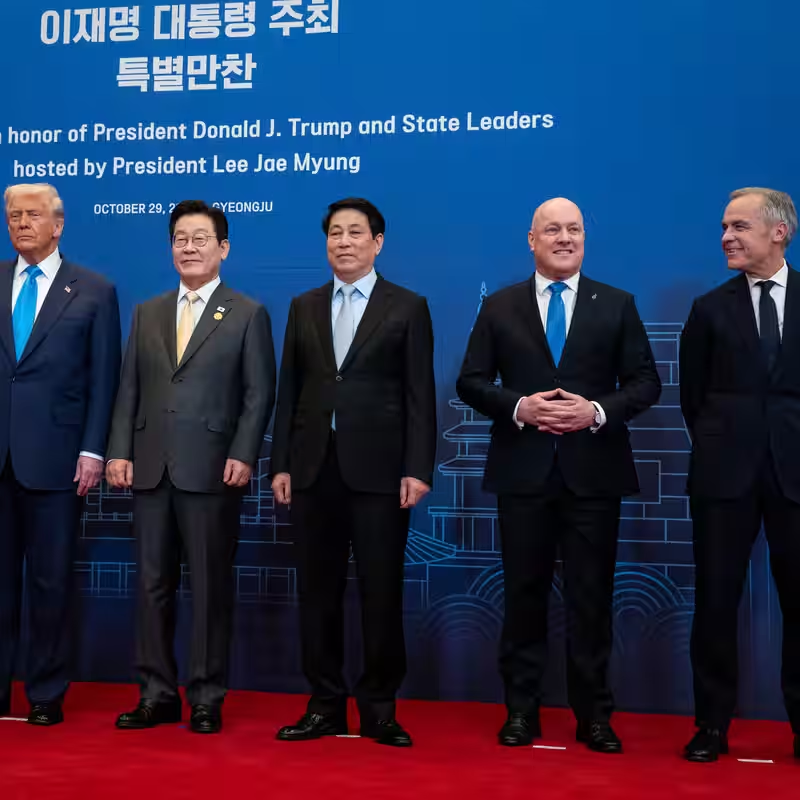Table of Contents
- Carney’s Apology to Trump
- The Controversial Reagan Ad
- Trade Talks Collapse Amid Tensions
- Ontario’s Role in the Diplomatic Row
- What Happens Next?
- Sources
Carney’s Apology to Trump
Canadian Prime Minister Mark Carney has publicly confirmed that he apologized to U.S. President Donald Trump over a politically charged television ad that reignited tensions between the two North American allies. Speaking to reporters on Saturday during the Asia-Pacific Economic Cooperation (APEC) summit in Gyeongju, South Korea, Carney said the apology took place earlier in the week during a private dinner with Trump.
“The president was offended by the act, or by the ad, rather,” Carney explained. “It’s not something I would have done — which is to put in place that advertisement — and so I apologized to him.”
The Controversial Reagan Ad
The ad in question was funded by Ontario, Canada’s most populous province, and aired during this year’s World Series broadcasts in the United States. It featured edited clips from a 1987 speech by former U.S. President Ronald Reagan, who famously warned about the economic dangers of tariffs.
While the ad accurately quoted Reagan’s words, it rearranged their original sequence — a detail Trump seized on, calling the commercial “fraudulent.” The U.S. president went further, alleging the ad was designed to influence an ongoing U.S. Supreme Court case reviewing the legality of his sweeping tariff policies.
Key Facts About the Ad:
- Funded by the Province of Ontario
- Aired during 2025 World Series games
- Used real quotes from Ronald Reagan’s 1987 speech
- Edited for narrative impact, not factual accuracy
Trade Talks Collapse Amid Tensions
The fallout was swift. Trump abruptly terminated renewed trade negotiations that had shown promise after a White House meeting between him and Carney in early October. In addition, the U.S. leader announced a new 10% tariff on Canadian exports — a move that could significantly impact cross-border commerce.
Canadian officials expressed disappointment, noting that the talks had been making “real progress” before the ad aired. The sudden reversal underscores how fragile diplomatic momentum can be when political sensitivities are triggered.
Ontario’s Role in the Diplomatic Row
Prime Minister Carney emphasized that he had personally asked Ontario not to air the ad, suggesting a disconnect between federal diplomacy and provincial messaging. While provinces in Canada have autonomy over certain promotional activities, foreign policy remains a federal responsibility.
“I made it clear this wasn’t helpful,” Carney said, distancing his government from the decision. Still, the incident highlights the challenges of managing subnational actors in international relations — especially when their actions land on the global stage.
What Happens Next?
With trade talks frozen and new tariffs looming, both nations face economic uncertainty. Analysts warn that prolonged friction could ripple through integrated supply chains in auto manufacturing, energy, and agriculture — sectors deeply intertwined across the U.S.-Canada border.
Diplomats on both sides are expected to seek quiet channels to de-escalate tensions. However, with the U.S. Supreme Court poised to rule on tariff legality and election-year politics heating up in America, resolution may not come quickly.
Sources
The New York Times: Carney Says He Apologized to Trump Over Ad Reviving Reagan’s Tariff Criticism




